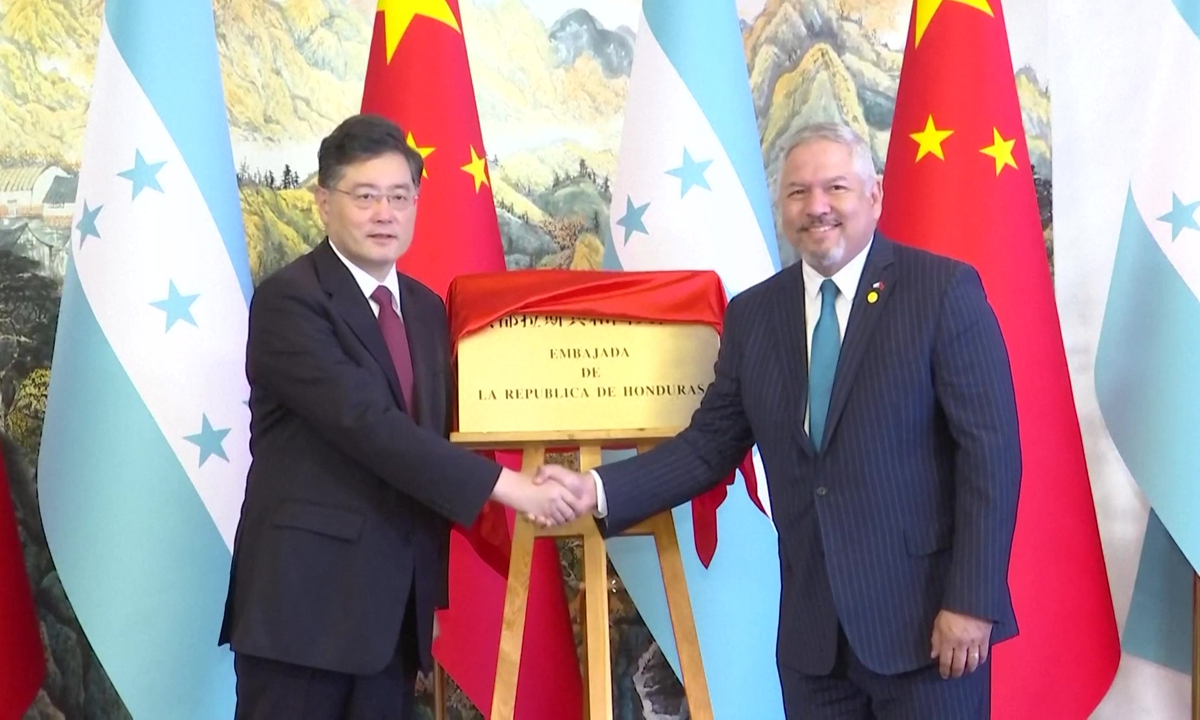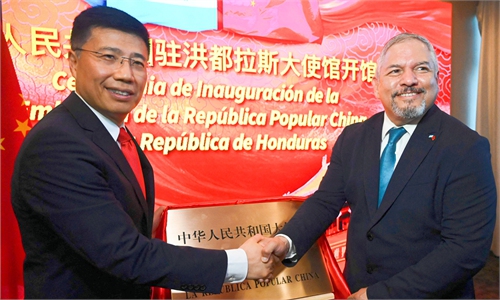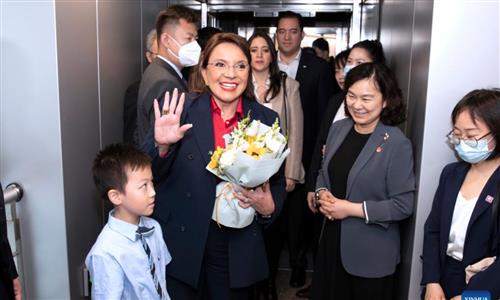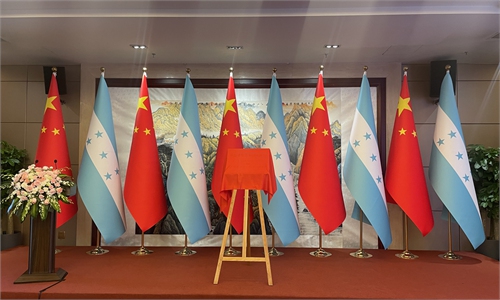
Honduras officially inaugurated its embassy in Beijing on Sunday, less than three months after China-Honduras diplomatic relations were established. The move was seen by diplomats and analysts as being of great significance to ushering in a new era of bilateral ties.
Diplomats and officials from both sides hailed the significant progress made in such a short period of time, which has a demonstrative effect for other Central and Latin American countries.
At around 11 am on Sunday, the inauguration ceremony of the Honduran Embassy in China was held at the Jianguomen Diplomatic Residence Compound in Beijing. Chinese State Councilor and Foreign Minister Qin Gang and Honduran Foreign Minister Enrique Reina attended the ceremony.
The opening ceremony commenced with the playing of the national anthems of both China and Honduras. Both Qin and Reina gave speeches and jointly unveiled the plaque for the Honduran Embassy.
Qin, on behalf of the Chinese government, extended hearty congratulations, saying that two months ago, China and Honduras officially established diplomatic relations on the basis of the one-China principle, fulfilling the long-standing aspiration of both peoples and ushering in a new era of China-Honduran relations.
In the past two months, both sides have firmly fulfilled their commitments to establishing diplomatic ties, resulting in a robust start to bilateral relations. The rapid development of China-Honduran relations fully demonstrates that adherence to the one-China principle is in line with international justice, the general trend, and the will of the people.
The inauguration ceremony was held during a six-day state visit by Honduran President Xiomara Castro to China, which was the first visit to the country by a Honduran president.
"President Castro's state visit to China is of milestone significance. The historic meeting between Chinese President Xi Jinping and President Castro will surely lead bilateral relations to new heights and realize new developments," Qin said at the inauguration ceremony.
Establishing diplomatic relations with China has ushered in a new era in Honduras' relations with the world, opening a door for us to a great nation of prosperity and development, Reina said during the inauguration ceremony.
"Honduras will firmly adhere to the one-China principle. We believe that China-Honduras relations will certainly continue to strengthen, bearing abundant fruit to benefit the peoples of both countries," Reina noted.
Demonstrative effect
In an exclusive interview with the Global Times following the ceremony, Reina said the two countries are expected to sign on Monday 19 memorandums and documents addressing cooperation including a Belt and Road memorandum.
Michel Campbell, Nicaragua's Ambassador to China, told the Global Times on Sunday that it is a matter of great pride and joy that China has welcomed another embassy from a Central American country.
As a country that established diplomatic relations with China one year ago, Nicaragua appreciates the brave decision taken by the president of Honduras to recognize the one-China principle, Campbell said.
The Nicaraguan envoy also expressed his belief that more countries from Central America and the Caribbean will make the correct decision, jointly promoting cooperation between the region and China.
As Honduras is a very important country in Latin America, the establishment of diplomatic ties between China and Honduras has a demonstrative effect on promoting China's relations with countries in Latin America, an important battlefield for the DPP authorities in Taiwan island to expand their "international space," Wu Hongying, former director of the Institute of Latin American Studies at the China Institute of Contemporary International Relations, told the Global Times on Sunday.
It's believed that more countries in the region will choose to follow the historic trend, Wu said.
Pragmatic cooperation
Before arriving in Beijing on Saturday, Castro had already carried out a series of activities in Shanghai, including a visit to the headquarters of the New Development Bank (NDB) of the BRICS and a meeting with the bank's president Dilma Rousseff. She also formally requested the country's admission to the NDB on Saturday, and visited a Huawei research center in Shanghai, highlighting pragmatic cooperation during her trip to China.
During a high-level entrepreneurs' exchange meeting between China and Honduras held in Beijing on Sunday, Fredis Cerrato, Honduran Minister of Economic Development, told the Global Times that nine Honduran exporters had signed agreements on exporting coffee and shrimp to China, and more products from Honduras will be exported to the Chinese market including tobacco and melon in the future.
"The first phase of cooperation is focused on agriculture, and we'll see more cooperation in other areas such as energy, telecommunication, infrastructure and tourism," Cerrato said.
Chinese experts believed that Honduras is working eagerly to enhance trade, investment, as well as infrastructure construction cooperation with China amid the sluggish global economy and impact of the COVID-19 pandemic.
"Signing a Belt and Road memorandum is another strategic decision made by the Honduran leaders, which could inject momentum into the bilateral cooperation, especially when there are specific projects and funds under the initiative," Wu said.
When asked about the "debt trap" narrative in the Western media in relation to the Belt and Road Initiative and whether it would create or exacerbate Honduras' debt crisis, Cerrato said the initiative is beneficial to both sides. "All the decisions we make are aimed at improving the living conditions of our people."
As of now, 21 Latin American and Caribbean countries have signed cooperation documents with China for the joint construction of the China-proposed Belt and Road Initiative, according to media reports. Under the initiative, China has played a key role in aiding infrastructure construction in the region, and the economic and social development of the region has also injected new momentum into China-Latin America relations.
"It's believed that cooperation between China and Honduras will achieve mutual benefits and win-win results on the basis of equality and reciprocal benefit. Therefore, the future of China-Honduras relations is promising and worth looking forward to," Wu said.




